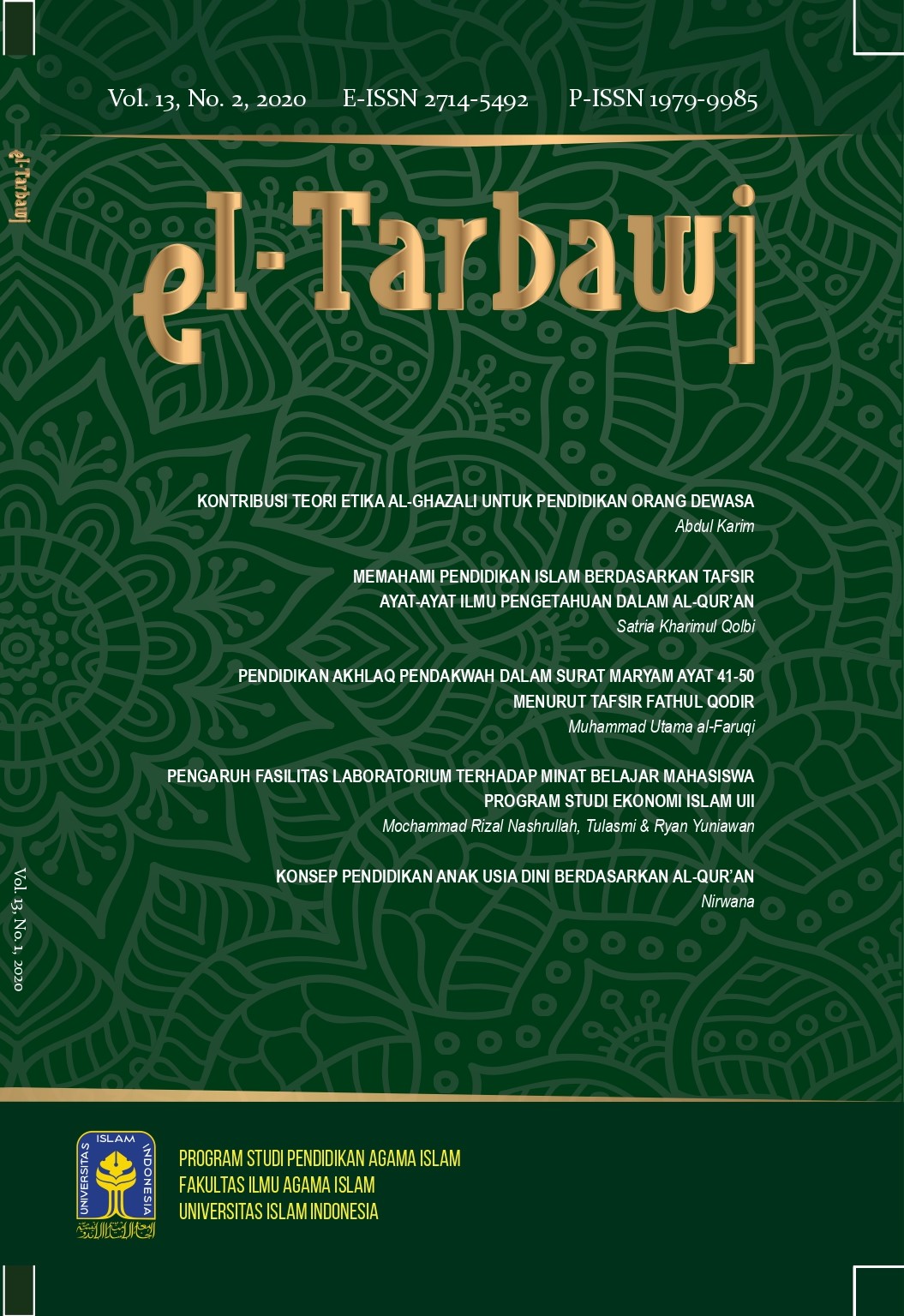Main Article Content
Abstract
Da'wah is one of the pillars of upholding the noble religion of Islam. As a form of worship for the perpetrators, and a way of calling out the truth to people outside of Islam, or who are in Islam. So, it is very necessary to have serious attention in instilling the characteristics of the da'wah implementers, or the preachers. Especially in their morality, as one of the most important assets in the success of the da'wah. Given that in the present era, there are so many people who dedicate themselves to da'wah, but in reality, they are the ones who destroy the image of Islam and the preaching itself with their bad behavior and morals. In the Al Quran, in Surah Maryam verses 41 to 50, the dialogue of the Prophet Abraham - 'alayhis salam - is narrated as one of the most important role models for preachers across generations. The preacher must have intellectual and emotional intelligence, must be patient and elegant. Without criticizing and making people run away from the religion. In fact, the characteristics of Muslims in Indonesia are the characteristics of being gentle, friendly, and cooperative. These findings contribute to the preachers so that what they preach brings many benefits, not harm.
Keywords
Article Details
Copyright (c) 2021 EL TARBAWI

This work is licensed under a Creative Commons Attribution-ShareAlike 4.0 International License.
Authors retain copyright and grant the journal right of first publication with the work simultaneously licensed under a Creative Commons Attribution (CC-BY-SA) 4.0 License that allows others to share the work with an acknowledgment of the work’s authorship and initial publication in this journal.
References
- Al-Alusiy, M. S. (t.t.). Ruhul Ma’ani (Vol. 16). al-Muniriyah.
- Al-’Ammar, H. bin N. bin A. R. (2018). Asalibud Da’wah al-Islamiyyah al-Mu’ashirah. Dar Kunuz Isybilia.
- Al-Andalusiy, A. H. (1993). Tafsir al-Bahr al-Muhith (Vol. 6). Beirut.
- Al-Bukhari, M. bin I. (2011). Shahih al-Bukhari. Dar al-Hadits.
- Al-Razi, M. bin U. F. (1981). Tafsir al-Fakhrur Razi (Vol. 21). Dar al-Fikr.
- Al-Samarqandiy, A. L. N. bin M. (1993). Bahrul Ulum (Vol. 3). Dar al-Kutub al-Ilmiyyah.
- Al-Syaukani, M. bin A. bin M. (2014a). Fathul Qodir (Vol. 1). Dar al-Wafa.
- Al-Syaukani, M. bin A. bin M. (2014b). Fathul Qodir (Vol. 3). Dar al-Wafa.
- Al-Utsaimin, M. bin I. (2013). Ushul fi al-Tafsir. Dar Ibn Hazm.
- Ali, A. A. M. bin N. (2004). Laka Ayyuda al-Da’i. Maktabatul Ulum wal Hikam.
- Ibnu al-Jauzi, A. al-F. J. (2002). Zaadul Masir fi Ilmi al-Tafsir. Dar Ibn Hazm.
- Ibnu ’Asyur, M. al-Thahir. (1985). Tafsir al-Tahrir wa al-Tanwir (Vol. 16). al-Dar al-Tunisiyah.
- Muhammad, Y. al-Sayyid, & al-Syami, S. A. (2008). Badi’atu al-Tafsir: Al-Jami’ Lima Fassaru al-Imam Ibnu al-Qoyyim al-Jauziyah (Vol. 2). Dar Ibnu Jauzi.
- Syakir, A. (2005). Umdatu al-Tafsir ’an al-Hafidz Ibnu Katsir: Mukhtashar Tafsir al-Qur’an al-’Adzim (Vol. 2). Dar al-Wafa.
- Tim Kemenag RI. (2006). Al-Qur’an dan Terjemahannya. Diponegoro.
- Zaydan, A. K. (2005). Ushul al-Da’wah (10th ed.). Muassasah al-Risalah.
References
Al-Alusiy, M. S. (t.t.). Ruhul Ma’ani (Vol. 16). al-Muniriyah.
Al-’Ammar, H. bin N. bin A. R. (2018). Asalibud Da’wah al-Islamiyyah al-Mu’ashirah. Dar Kunuz Isybilia.
Al-Andalusiy, A. H. (1993). Tafsir al-Bahr al-Muhith (Vol. 6). Beirut.
Al-Bukhari, M. bin I. (2011). Shahih al-Bukhari. Dar al-Hadits.
Al-Razi, M. bin U. F. (1981). Tafsir al-Fakhrur Razi (Vol. 21). Dar al-Fikr.
Al-Samarqandiy, A. L. N. bin M. (1993). Bahrul Ulum (Vol. 3). Dar al-Kutub al-Ilmiyyah.
Al-Syaukani, M. bin A. bin M. (2014a). Fathul Qodir (Vol. 1). Dar al-Wafa.
Al-Syaukani, M. bin A. bin M. (2014b). Fathul Qodir (Vol. 3). Dar al-Wafa.
Al-Utsaimin, M. bin I. (2013). Ushul fi al-Tafsir. Dar Ibn Hazm.
Ali, A. A. M. bin N. (2004). Laka Ayyuda al-Da’i. Maktabatul Ulum wal Hikam.
Ibnu al-Jauzi, A. al-F. J. (2002). Zaadul Masir fi Ilmi al-Tafsir. Dar Ibn Hazm.
Ibnu ’Asyur, M. al-Thahir. (1985). Tafsir al-Tahrir wa al-Tanwir (Vol. 16). al-Dar al-Tunisiyah.
Muhammad, Y. al-Sayyid, & al-Syami, S. A. (2008). Badi’atu al-Tafsir: Al-Jami’ Lima Fassaru al-Imam Ibnu al-Qoyyim al-Jauziyah (Vol. 2). Dar Ibnu Jauzi.
Syakir, A. (2005). Umdatu al-Tafsir ’an al-Hafidz Ibnu Katsir: Mukhtashar Tafsir al-Qur’an al-’Adzim (Vol. 2). Dar al-Wafa.
Tim Kemenag RI. (2006). Al-Qur’an dan Terjemahannya. Diponegoro.
Zaydan, A. K. (2005). Ushul al-Da’wah (10th ed.). Muassasah al-Risalah.
